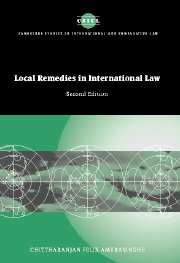Book contents
- Frontmatter
- Contents
- Preface
- Table of cases
- List of abbreviations
- Part I Prolegomena
- Part II Application of the rule
- 6 Incidence of the rule
- 7 Scope of the rule
- 8 Limitations on the rule
- 9 The rule as applied to the use of procedural resources
- 10 Waiver of the rule and estoppel
- 11 Burden of proof
- 12 Procedural matters connected with the rule
- Part III Peripheral and analogous applications of the rule
- Part IV Nature of the rule
- Part V Epilogue
- Index
- CAMBRIDGE STUDIES IN INTERNATIONAL AND COMPARATIVE LAW
12 - Procedural matters connected with the rule
from Part II - Application of the rule
Published online by Cambridge University Press: 03 May 2010
- Frontmatter
- Contents
- Preface
- Table of cases
- List of abbreviations
- Part I Prolegomena
- Part II Application of the rule
- 6 Incidence of the rule
- 7 Scope of the rule
- 8 Limitations on the rule
- 9 The rule as applied to the use of procedural resources
- 10 Waiver of the rule and estoppel
- 11 Burden of proof
- 12 Procedural matters connected with the rule
- Part III Peripheral and analogous applications of the rule
- Part IV Nature of the rule
- Part V Epilogue
- Index
- CAMBRIDGE STUDIES IN INTERNATIONAL AND COMPARATIVE LAW
Summary
There are a few matters, particularly of procedure, touching upon the implementation of the rule of local remedies which call for consideration. They are important in so far as they may result in various consequences for both the respondent and the claimant, or regulate the manner in which tribunals or organs applying the rule may conduct the proceedings, both as regards the exhaustion of remedies itself and the substantive merits of cases.
The time for raising the objection based on the rule
As already seen in Chapter 10, the benefit of the rule could be forfeited by the respondent by an implication of a waiver, if the objection that the rule had not been observed is not raised in the proceedings when it should be. Thus, it becomes important to determine what is the appropriate time for such action after which the benefit of the rule would be forfeited. In this area, as will be seen from Chapter 13, there are some differences between the law governing diplomatic protection and the law of human rights protection. In the latter, there is a tendency to be open to variation.
The precedents that exist as far as diplomatic protection is concerned are based on the practice of the PCIJ and the ICJ. The objection that local remedies have not been exhausted contests the admissibility of the application and is thus of a preliminary nature.
- Type
- Chapter
- Information
- Local Remedies in International Law , pp. 293 - 300Publisher: Cambridge University PressPrint publication year: 2004



